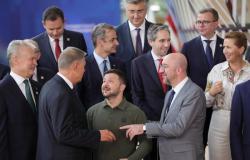
One of the most divisive topics, that of intensive farming and pollution has been at the center of many controversies and demonstrations. Issues that the candidates in the next European elections, if elected, will have to address.
One of the thorniest issues for the European Union is that of intensive farming and the many related ethical and environmental implications: from the repercussions on animal welfare to those on the environment and public health. A topic as delicate as it is divisive also in relation to the amount of community funds allocated to those who work in this sector following, in theory, the pre-established rules.
There is talk of economic support for the 27 states for an amount between 34 and 48 billion euros per year despite the damage these farms cause.
We interviewed some of the candidates* for the next European elections on 8 and 9 June 2024, who were asked what needs to be done in this sector that is as delicate as it is strategic.
Stop subsidies for intensive farming?
For Rosa Maria Di Giorgi, candidate with Italia Viva in the United States of Europe list, intensive farming “on the one hand should be taxed more” since “it is bad for the animals and the environment but, on the other, we need to encourage different policies, new forms of farming”. He believes it is important to direct these subsidies “towards projects for young people and above all in schools and training”.
Also for Giovanni Mori of Alleanza Verdi e Sinistra in the North-West constituency it is necessary to direct more carefully these funds currently distributed “on the basis of quantity and not on the basis of quality”. He believes it is essential to give more to those who promote a transformation, to those who “increase ecosystem services that are capable of storing much more carbon”.
Andrea Zanoni is of the same opinion, candidate with the Democratic Party in the North East constituency: “intensive farming is unsustainable because it consumes soil and disfigures it. And then they contribute to raising temperatures due to greenhouse emissions. Therefore the subsidies should certainly be redirected towards more sustainable agriculture, helping small and medium-sized agricultural businesses and focusing heavily on new technologies to progressively eliminate pesticides”. Gabriella Zanzanaini, from NOS in the We are Europeans of Action list in the Center constituency highlights another problem, the almost total impossibility for small farmers to access subsidies “in Italy 11% of farmers are smaller” and this difficulty it was confirmed by those who wanted to “do biodynamics, wanted to change the use of the land, but accessing subsidies was impossible for them”.
In the end Giacomo Zattini, candidate with the 5 Star Movement in the North East constituency recalls that “there are both incentives for intensive farming and incentives, for example, for fuel for tractors. If on the one hand, therefore, they should be removed immediately, on the other hand other incentives must provide an alternative because, for example, with diesel, farmers complain that (…) for tractors this is not yet a possibility” . As far as intensive farming is concerned, it is very clear “we must move towards a very rapid decommissioning and towards a moratorium for new ones, but taking into account the world of work”, the people who work must be protected.
CAP: what do the candidates think of the common agricultural policy recently approved in Europe?
Recently, the reform of the Common Agricultural Policy (CAP) which provides, for example, the possibility of crop diversification instead of rotation. Furthermore, the obligation to keep a minimum share of arable land fallow has been eliminated with some exceptions. But what do the candidates we met think of the CAP?
Giovanni Mori’s (AVS) opinion is very clear “The first thing to change about the CAP is the way in which the funds are distributed”. As initially thought, “it was going in the right direction”. He also states that agriculture may be “one of the major problems, but it is also one of the major potential solutions.”
Also Andrea Zanoni, PD, looks to the future “I would give more incentives to organic companies that implement agroecology. I would insist a lot on research, I would encourage small and medium-sized agricultural companies and I would remove subsidies from intensive farming and large companies that use pesticides excessively.”
Gabriella Zanzanaini, NOS – We are Europeans of Action would prefer to “make everything simpler, more accessible” but it is necessary “to have more stringent environmental constraints”.
Giacomo Zattini, M5S believes that it should be modified so that “support is guaranteed to small-medium farmers” and more generally “farmers are incentivized not only to produce healthy and healthy products but also to be remunerated for the ecosystem services they offer”.
Cultured meat and new foods
A last major theme is that of the evolution of agriculture, of future of nutritionfrom the production of insect flour up to the production of synthetic meat. Very divisive topics as demonstrated by the positions of the candidates.
For Giacomo Zattini, M5S “Cultivated meat? It is a short-sightedness that we will carry with us in the coming years and we will regret it at a certain point, as we did for the electric car” although it can “also and above all represent an alternative to the exploitation of animals in intensive farming. In short, I’m not about to deny anything, not even when it comes to insect flour.”
Giovanni Mori, AVS, is softer, “there is no single solution even in this case. In a range of many solutions also the novel food is fundamental.”
Just like Andrea Zanoni, PD: “nutrition should be based above all on a vegetarian diet, on zero kilometer agricultural products and therefore finally cultivate our fields and our countryside”. No opposition to the production of cultured meat or insect flour.
Gabriella Zanzanaini, NOS – We are Europeans of Action, is also open-minded: “for the transition we must leave everyone free, therefore awareness is also important” and recognizes that “we also need these new technologies to facilitate the transition itself. In any case, all novel food is useful in this transition. In the end everyone must be free to choose.”
Rosa Maria Di Giorgi, IV – United States of Europe list, holds a diametrically opposite opinion and candidly states “For me these are shocking proposals”. And then “I believe that we should move more and more towards a Mediterranean diet, that we should eat less and less meat” and encourage “cultivations with products that are as free as possible from pesticides, farming that is respectful of the animal and the territories. As far as insects are concerned, however, I will do everything to ensure that all this does not happen: I will be one of those parliamentarians who will not sign similar measures.”
And what do you think about these issues? Which of these positions is closest to your thinking?
*The candidates were chosen based on their skills and knowledge on environmental issues, the invitation was sent to all 9 main political forces. The following parties did not respond or did not accept the invitation: Forza Italia, Fratelli d’Italia, Lega and Pace Terra Dignità.
Here are the full interviews with the various candidates:
You might also be interested in:
Nuclear yes or no? Which energy source should we focus on in Europe according to the candidates in the 2024 elections





